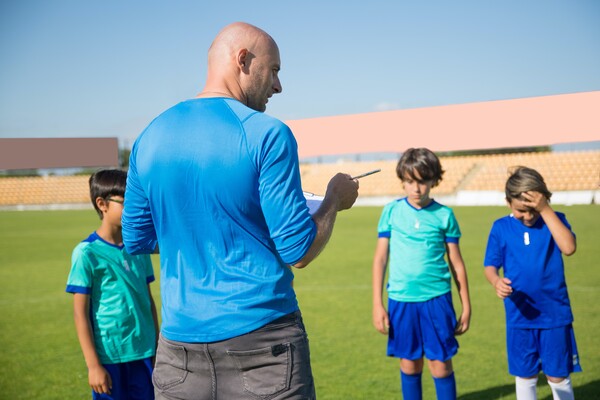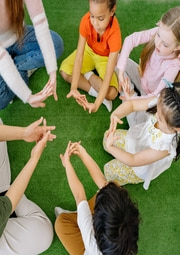How To Encourage Teamwork While Making Learning Fun for Kids
Teamwork and fun – two simple yet powerful words that can transform the way kids learn. When children collaborate, they discover the joy of shared success and the comfort of mutual support. When learning is fun, curiosity sparkles in every corner of their minds. Every challenge turns into an exciting adventure.
So, how do we intertwine teamwork and fun to create a dynamic, inclusive, and stimulating learning environment for kids? Let’s embark on this journey together to unveil the ways of making learning not just an academic task, but a life-changing experience that nurtures collaboration, creativity, and above all, cheerfulness.
Group Projects as a Playground for Teamwork and Fun
Nothing blends the elements of teamwork and fun quite like group projects. Group projects and games motivate children to pool their skills and ideas, igniting a sense of unity and shared accomplishment. While one child’s strength may lie in coming up with creative ideas, another might excel at organizing tasks or conducting research. This cooperative learning encourages the understanding that everyone has something unique to offer, instilling respect for diversity.
To enhance the enjoyment, opt for project topics that truly resonate with the children’s interests. Examples include creating a captivating comic strip, constructing an eco-friendly model house, or organizing a mini-school carnival. As kids engage in these exciting tasks, they not only have fun but also develop valuable skills like collaboration, compromise, and effective communication. These skills extend beyond the classroom, preparing them for real-world scenarios.
Consult A Picker Wheel to Form Teams

To ensure a fair and random distribution of roles, use a picker wheel to form teams. The picker wheel is an online tool that randomly selects names or numbers to create diverse groups. This method eliminates any chance of favoritism or clique formation, promoting inclusivity and equal opportunities for all children. Additionally, the element of surprise when it comes to a random team generator can add to the excitement and fun aspect of forming groups.
Once teams are formed, encourage team-building activities like icebreakers or trust exercises to build camaraderie and break the ice between children who may not have worked together before.
Roleplay Activities to Boost Teamwork and Enjoyment
The world of roleplay offers a fantastic platform for kids to work together while fully immersed in fun and imaginative scenarios. Whether they’re pretending to be astronauts exploring distant planets, detectives solving a mystery, or chefs running a bustling restaurant, roleplay nurtures teamwork in a naturally engaging way. As they navigate their make-believe worlds, children negotiate roles, make collective decisions, and collaboratively problem-solve, all of which foster team-building.
As laughter and creativity fill the air, learning becomes an adventure full of enjoyment and discovery. Well-planned roleplay activities can thus be an effective tool in making learning both a cooperative and joy-filled journey for kids.
Game-Based Learning for Fun and Team Interaction
Integrating games into the learning process is another robust approach to promoting teamwork while making education fun. Games like charades, Pictionary, or trivia quests can be adapted to various subjects, making learning interactive and entertaining.
For instance, in a history-themed trivia quest, teams can compete to answer questions about historical events or figures, fostering team spirit and a zest for knowledge. A science-themed Pictionary game can be a delightful way to engage children in understanding abstract concepts.
By drawing and guessing elements, team members not only make the ideas more tangible but also strengthen their bonds and nurture a positive attitude toward learning. This cooperative endeavor encourages strategizing, effective communication, and shared laughter, creating a fun-filled experience that promotes both enjoyment and educational growth.
Incorporating Technology for Collaborative Learning and Fun
Incorporating technology into the learning process can make education more interactive, collaborative, and fun. Apps and websites offer a multitude of engaging educational games that promote teamwork.
For instance, online quiz platforms can be used to create team-based trivia where children work together to answer questions, fostering a sense of camaraderie and shared accomplishment. Similarly, digital storytelling tools can provide a platform for children to collaborate on creating and narrating a story, inspiring creative expression while developing teamwork skills.
While technology can be a powerful tool in enhancing teamwork and fun in learning, it’s essential to strike a balance and ensure that children also have opportunities for face-to-face interaction and hands-on activities. A healthy mix of traditional methods and technology can create a well-rounded learning experience that boosts teamwork and enjoyment.
Final Thoughts
Incorporating teamwork and fun into the learning process can transform education into an exciting journey of discovery for children. By carefully integrating group projects, picker wheels, roleplay activities, game-based learning, and technology, we can create an environment where kids eagerly collaborate, learn, and grow. Not only do these methods make learning enjoyable, but they also teach children the invaluable skills of teamwork, cooperation, and mutual respect.
The key is to embrace diversity, fuel curiosity, and celebrate every small achievement as a team. As educators, parents, and caregivers, we can thus turn classrooms into playgrounds of knowledge, where learning is not a chore to dread but an adventure to eagerly anticipate. Let’s nurture children’s potential in a spirit of fun and collaboration, preparing them not just for the academic world, but for life’s broader canvas.





